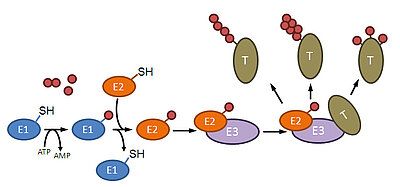Plants are in constant interaction with microbes, some of which are capable to infect them and cause disease. The invasion by microbes is perceived through receptors that recognize so called pathogen associated molecular patterns (PAMPs), such as flagellin, lipopolysacharides and chitin. Activation of these receptors triggers a plethora of reactions, which culminate in the activation of the so called PAMP-triggered immunity (PTI). Pathogenic microorganisms have developed means to counter PTI by delivering virulence effector proteins or compounds that suppress immune responses into the plant cell. In an “arms race” plants evolved another subset of receptors that detect effectors or their activities and activate an effector-triggered immunity (ETI).
We have identified a group of related plant u-box type E3 ligases (PUBs) that are strongly induced in response to several PAMPs. The PUB group comprises PUB22, PUB23 and PUB24, which act as negative regulators of PAMP triggered signaling and PTI. Several responses are de-repressed in plants mutated in pub22-24 genes. These responses include the oxidative burst, MAP kinase 3 (MPK3) activity and transcriptional activation of marker genes. The de-repression of responses is common to the perception of several PAMPs indicating that it involves a process shared by different receptors. We are currently engaged in the analysis of proteins that are targeted for ubiquitination during the immune response by PUBs. Furthermore we are elucidating the ubiquitination process that is mediated by these ubiquitin ligases.
This page was last modified on 27 Jan 2025 27 Jan 2025 .


